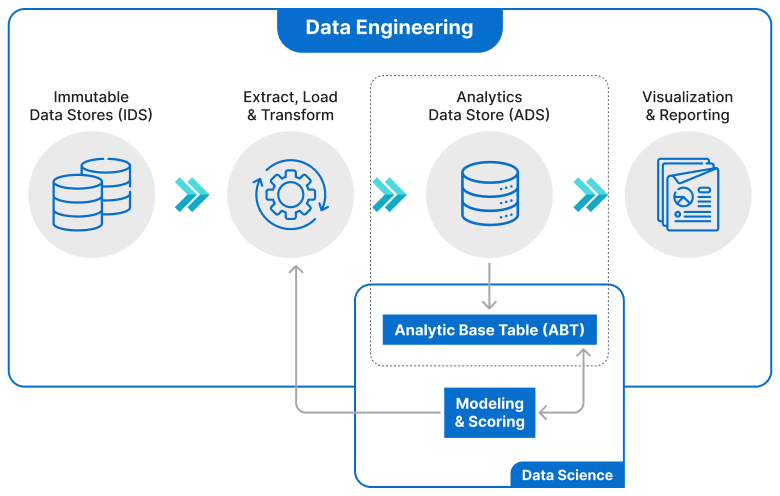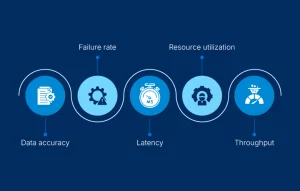Data is the driving force behind modern businesses, flowing from numerous sources in raw and unstructured forms. Data engineering is the process by which raw data is transformed into structured, reliable, and actionable insights, enabling businesses to make decisions rooted in data, moving a business toward success. Businesses need data engineering to help them with effective management and processing huge amounts of data they generate daily.
Data engineering ensures quality, scalability, and safety of data to keep up competitive advantage and foster business in an ever-changing digital landscape.
This blog explains the imperative role of data engineering services for modern business and how they can enhance data-driven strategies, in turn, allow improvements on the entire operation efficiency and support sustainable growth.
Let’s begin by understanding what data engineering is
Data engineering means creating, developing, and operating infrastructure and systems by which massive data can be gathered, stored, processed, and analyzed. Data engineering ensures the designing of data pipelines combined with raw data from various sources and its transformation into well-structured, usable formats for later use by data scientists, analysts, and business decision-makers.
This encompasses everything from data ingestion, cleaning, integration, to any other process possible, all with guaranteed consistency and quality, under optimal performance and scalability in complex, distributed environments.
Why is data engineering so crucial right now?
Businesses rely increasingly on data as the catalyst for informed decisions, innovation, and competition. With today’s data explosion coming from all modes of sources be it IoT devices, social media accounts, cloud services – organizations need robust systems to help manage and process this information.
Data engineering provides a solid foundation to deal with massive data, managing quality, scalability, and accessibility. Any advanced analytics, machine learning or real-time decision making is truly powered by the data; therefore, it requires excellent data preparation.
Key components of data engineering
- Data collection: It collects data from all sources such as databases, APIs, and IoT devices.
- Data storage: Efficiently stores vast amounts of data in databases, data lakes, or warehouses.
- Data governance: Development of data quality, privacy, security, and compliance standards; management of access, metadata, and data integrity.
- Data processing: Raw data is formatted in a structured way suitable for analysis.
- Data integration: Merging data from different sources to provide an integrated view.
Discover how our data engineering services can transform your data landscape, enabling efficient processing, robust integration, and actionable intelligence.
What are the challenges that modern businesses face without data engineering?
Businesses encounter several challenges that hinder their ability to leverage data effectively without a robust data engineering strategy:
1. Data silos and fragmentation: Normally, data captured from different sources is mostly isolated within different systems, making information disjointed and inaccessible for integration.
2. Poor data quality: Raw data may contain errors, duplicates, and inconsistencies, resulting in unreliable insights that can lead to misinformed decision making.
3. Inability to scale: The companies that don’t have a data engineering solution are unable to manage and process large datasets, thus slowing down analysis and causing performance bottlenecks.
4. Delayed decision making: Since businesses take too long to process and analyze data, they end up being late in reacting to market trends or operational issues.
5. Increased security risks: Since sensitive information is not handled efficiently, it increases vulnerability to breaches and also suggests non-compliance of data regulation.
6. Manual data processing: The tasks of gathering, converting and analyzing the data using manual processes are cumbersome, error-prone, and time-consuming, thus affecting cost and productivity.
Suggested reading: 5 common data engineering challenges and how to address them
How does data engineering help modern businesses in addressing these challenges?
1. Breaking down data silos: Data engineering integrates different sources of data into unified systems for business to ensure that a business gets an integrated, central view of its data; therefore, better collaboration and comprehensive insights.
2. Improving data quality: Data engineering helps with data cleaning, validation and enrichment, ensuring data is relevant, consistent, and reliable, fostering trust in using data for decision-making.
3. Enabling scalability: Data engineering creates scalable architectures that grow with business, enabling companies to manage increasing data volumes without impacting speed or performance.
4. Faster decision making with real-time data: With the automation of the data pipelines and its real-time processing, data engineering promotes a faster flow of data, enabling businesses to take prompt decisions with data support and respond promptly to changes.
5. Enhancing data security and compliance: Data engineering provides the incorporation of multiple security features such as encryption, access controls, and auditing to help protect sensitive information as well as ensure businesses comply with data privacy requirements.
6. Automating data workflows: Automated data pipelines remove unnecessary manual data processing and, consequently, reduce errors, save time and slash down the operational cost for a business, which in turn increases its overall efficiency.
By addressing these issues, data engineering enables businesses to optimize their operations, gain valuable insight, and stay ahead in a rapidly changing marketplace.
Suggested: Explore how Softweb’s data engineering efficiency fuels informed decisions for e-commerce giant

Data engineering services
Consulting and strategy development
Data engineering services begin with consulting to help businesses define their data strategy. This includes understanding a business’s data needs, identifying key data sources, and developing a roadmap for implementing data engineering solutions.
Data pipeline development
Core services of data engineering revolve primarily around the creation and management of data pipelines, especially ETL and ELT pipelines. These enable the stream flow from the source to the destination, so the necessary data can be processed almost in near real-time or real-time for analysis.
Read more: ETL vs ELT – understanding the key differences
Data warehousing and architecture
A data warehouse requires proper design to store and manage large volumes of data. Data engineering services cover the design and implementation of a data warehouse, ensuring that they are scalable, secure, and optimized for performance.
Data integration and transformation
It includes the services of aggregating data from different sources and bringing it into a configurable format ready for analysis. This also involves data cleaning, normalization, and structuring to gain consistency and correctness in the datasets.
Cloud data engineering
With the emergence of cloud computing, most businesses are shifting their data structure into cloud. Data engineering solutions help businesses utilize cloud platforms like AWS, Azure, and Google Cloud to efficiently manage their data.
Big data engineering
Special techniques of engineering are required to deal with enormous volumes of data which are known as big data. Big data engineering services provide the design and implementation of systems that could process and analyze humongous datasets.
Best practices for successful data engineering
Building a strong foundation
Proper planning and design are crucial for successful data engineering. This involves selecting the right tools, technologies, and processes to meet your business’s specific requirements.
Automation and continuous integration
Data pipelines can be automated, and CI/CD can be put into place to speed up the quality, efficiency, and reliability of data processes.
Regular monitoring and maintenance
Keeping data pipelines healthy and efficient requires regular monitoring and maintenance. This ensures that any issues are quickly identified and resolved.
Collaboration between teams
Effective communication between data engineers, analysts, and business stakeholders is essential for successful data engineering. Collaboration ensures that data solutions meet the needs of the business.
Emerging trends in data engineering
AI and machine learning integration
This integration of AI and machine learning into data engineering changes the face of data processing and analysis in business. It has opened the doors to better data processing and predictive analytics.
Edge computing
Edge computing is becoming increasingly important for data engineering because it gives businesses the capability to process data as close to its source as possible, offering less latency.
Real-time data processing
Data engineering should raise its gear to support the rise of real-time analytics. Data processing in real-time is really useful for responsive actions under changing conditions.
DataOps
DataOps helps managing the data lifecycle through better collaboration and cutting down time to insight as it is an amalgamation of practices encompassing data engineering, data integration, and data management.
Suggested: 5 Data engineering trends: A proactive approach
Leverage data engineering for better business outcomes
Data engineering indeed is a cornerstone of modern business strategy. A good investment in data engineering services can help in improving data quality, enhancing operational efficiency, helping businesses achieve a competitive edge in their industry. So, whether it is the beginning or optimization of existing data infrastructure, a well-executed data engineering strategy can help drive your business forward. Contact our data experts and learn more about how data engineering services can support your business growth.









